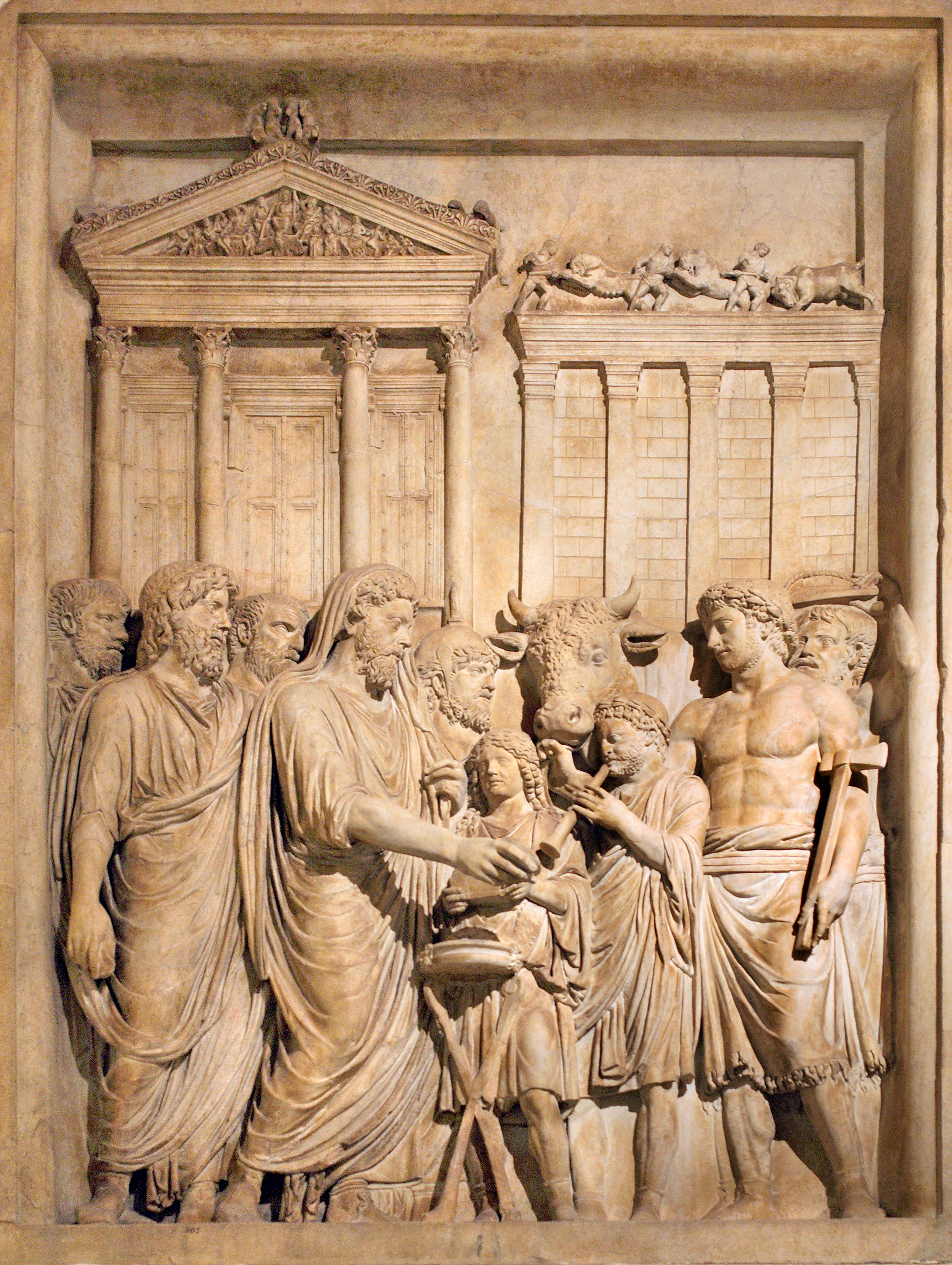
Roman imperial cult
The Roman imperial cult (Latin: cultus imperatorius) identified emperors and some members of their families with the divinely sanctioned authority (auctoritas) of the Roman State. Its framework was based on Roman and Greek precedents, and was formulated during the early Principate of Augustus. It was rapidly established throughout the Empire and its provinces, with marked local variations in its reception and expression.
Augustus's reforms transformed Rome's Republican system of government to a de facto monarchy, couched in traditional Roman practices and Republican values. The princeps (emperor) was expected to balance the interests of the Roman military, Senate and people, and to maintain peace, security and prosperity throughout an ethnically diverse empire. The official offer of cultus to a living emperor acknowledged his office and rule as divinely approved and constitutional: his Principate should therefore demonstrate pious respect for traditional Republican deities and mores.
A deceased emperor held worthy of the honor could be voted a state divinity (divus, plural divi) by the Senate and elevated as such in an act of apotheosis. The granting of apotheosis served religious, political and moral judgment on Imperial rulers and allowed living emperors to associate themselves with a well-regarded lineage of Imperial divi from which unpopular or unworthy predecessors were excluded. This proved a useful instrument to Vespasian in his establishment of the Flavian Imperial Dynasty following the death of Nero and civil war, and to Septimius in his consolidation of the Severan dynasty after the assassination of Commodus.
The imperial cult was inseparable from that of Rome's official deities, whose cult was essential to Rome's survival and whose neglect was therefore treasonous. Traditional cult was a focus of Imperial revivalist legislation under Decius and Diocletian. It therefore became a focus of theological and political debate during the ascendancy of Christianity under Constantine I. The emperor Julian failed to reverse the declining support for Rome's official religious practices: Theodosius I adopted Christianity as Rome's state religion. Rome's traditional gods and imperial cult were officially abandoned.
Historical evaluations[edit]
The Roman imperial cult is sometimes considered a deviation from Rome's traditional Republican values, a religiously insincere cult of personality which served Imperial propaganda.[240][241] It drew its power and effect, however, from both religious traditions deeply engrained in Roman culture, such as the veneration of the genius of each individual and of the ancestral dead, and on forms of the Hellenistic ruler cult developed in the eastern provinces of the Empire.
The nature and function of imperial cult remain contentious, not least because its Roman historians employed it equally as a topos for Imperial worth and Imperial hubris. It has been interpreted as an essentially foreign, Graeco-Eastern institution, imposed cautiously and with some difficulty upon a Latin-Western Roman culture in which the deification of rulers was constitutionally alien, if not obnoxious.[242] In this viewpoint, the essentially servile and "un-Roman" imperial cult was established at the expense of the traditional Roman ethics which had sustained the Republic.[243] For Christians and secularists alike, the identification of mortal emperors with godhead represented the spiritual and moral bankruptcy of paganism which led to the triumph of Christianity as Rome's state religion.[244][245]
Very few modern historians would now support this point of view. Some – among them Beard et al. – find no distinct category of imperial cult within the religio-political life of Empire: the Romans themselves used no such enveloping term. Cult to living or dead emperors was inseparable from Imperial state religion, which was inextricably interwoven with Roman identity and whose beliefs and practices were founded within the ancient commonality of Rome's social and domestic mos maiorum. Descriptions of cult to emperors as a tool of "Imperial propaganda" or the less pejorative "civil religion" emerge from modern political thought and are of doubtful value: in Republican Rome, cult could be given to state gods, personal gods, triumphal generals, magnates, benefactors, patrons and the ordinary paterfamilias – living or dead. Cult to mortals was not an alien practise: it acknowledged their power, status and their bestowal of benefits. The Augustan settlement appealed directly to the Republican mos maiorum and under the principate, cult to emperors defined them as emperors.[246]
With rare exceptions, the earliest institution of cult to emperors succeeded in providing a common focus of identity for Empire. It celebrated the charisma of Roman Imperial power and the meaning of Empire according to local interpretations of romanitas,[247] firstly an agency of transformation, then of stability. Cult to Imperial deities was associated with commonplace public ceremonies, celebrations of extraordinary splendour and unnumbered acts of private and personal devotion. The political usefulness of such an institution implies neither mechanical insincerity nor lack of questioning about its meaning and propriety: an Empire-wide, unifying cult would necessarily be open to a multitude of personal interpretations but its significance to ordinary Romans is almost entirely lost in the critical interpretations of a small number of philosophically literate, skeptical or antagonistic Romans and Greeks, whether Christian or Hellene.[248][249] The decline of prosperity, security and unity of Empire was clearly accompanied by loss of faith in Rome's traditional gods and – at least in the West – in Roman emperors. For some Romans, this was caused by the neglect of traditional religious practices. For others – equally Roman – breakdown of empire was God's judgment on faithless or heretical Christians and hardened pagans alike.
As Roman society evolved, so did cult to emperors: both proved remarkably resilient and adaptable. Until its confrontation by fully developed Christian orthodoxy, "imperial cult" needed no systematic or coherent theology. Its part in Rome's continued success was probably sufficient to justify, sanctify and "explain" it to most Romans.[250][251] Confronted with crisis in Empire, Constantine matched the Augustan achievement by absorbing Christian monotheism into the Imperial hierarchy. Cult to emperors was not so much abolished or abandoned as transformed out of recognition.[252]